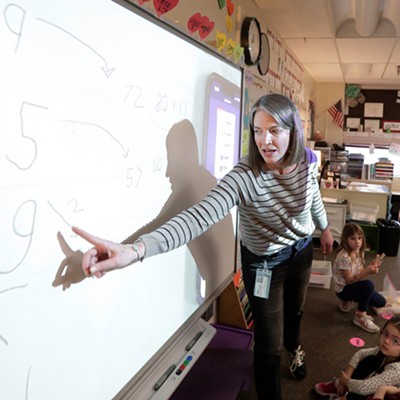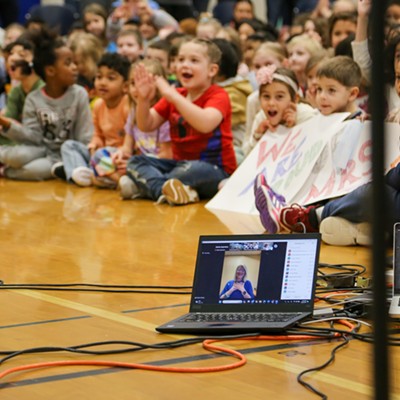Adam Swinyard was sworn in as Spokane Public Schools superintendent in July 2020. It was a crazy time for everyone — especially educators.
"The pandemic has put us in the midst of a storm," Swinyard said to the Spokane School Board on the night of his swearing-in ceremony.
Two years later, the storm is receding, but the district is still grappling with the enduring effects of the COVID-19 pandemic. The Inlander met with Swinyard at the school district office to talk about enrollment, mental health, staffing and the district's goals for the new school year.
INLANDER: Is there a big takeaway you or the district learned during the pandemic?
SWINYARD: Just the importance of relationships and community and how our schools are a hub for supports, for services. [The schools] are such a key landmark in our neighborhoods. And that's something we knew pre-pandemic, but the pandemic certainly reinforced how incredibly important it is for kids to feel that sense of belonging and to be able to socialize and interact and communicate and be involved in activities outside the school day... Whether that's sports or clubs or performing arts, those are the types of things that are really essential to a student's school experience.
Is there anything you're particularly concerned about going into this year?
Mental health continues to be very prominent on our mind. The pandemic impacted our community in lots of different ways and disproportionately impacted some parts of our community. And we're really committed to making sure that we've got supports and resources in place.
Spokane Public Schools is actually one of the largest mental health providers in the county. So we have therapists inside of our schools. We also make sure that we have invested in school counselors and intervention staff so that we have a really strong network of resources and supports for kids.
Is learning loss something you're concerned about?
I think certainly you're hearing lots of national discourse about learning loss. Certainly the pandemic impacted students in a variety of different ways. Certainly distance learning created an impact to progress and learning, and our teachers were really mindful and focused on that this past year. I think as we move forward, we will deepen our understanding of the impacts of the pandemic and try to put ourselves in the best position possible to respond to the needs of the students that were most impacted.
Washington saw a big statewide drop in enrollment, and that was the case in Spokane as well. Is that something you're concerned about? Do you see that going in the opposite direction?
We're hearing from families — even families that have historically been a public school family. We know that some of them decided on a different schooling option during the pandemic. What we hear from them is the awareness that they have around transitions for their student. And even though they may have historically been a public school family, their student is now acclimated to a different schooling option. And they don't want to put them through another transition.
All indications [show] that our enrollment will stabilize over time and align with historic trends and the growth that we're seeing in Spokane County.
When you talk to parents who made that choice, do you get a sense for their reasons why?
I think there was a wide range of reasons why families made choices during the pandemic to transition away from a public school setting, or whatever school setting their current student was in. So I'm not sure any type of school setting was immune from families not agreeing with the approach, or were concerned about COVID and kind of shifted their options. So I think we saw that across all parts of the K-12.
We had families that were concerned about masks being on, masks being off. We had families concerned about social distancing; we had families concerned about having vaccinations, not having vaccinations. There was a broad range of opinions and perspectives.
Is the district looking at any approaches to draw some of those families back?
One of our main focuses is to continue to provide an incredible academic experience for kids. We have historically low class sizes; we're experiencing record high graduation rates; we have more resources and support inside of our schools than ever before; we had four of the six Spokane scholars from our school district. So we're continuing to share the story of the really great academic in-school experience we provide for kids.
We've also learned from the pandemic that families are interested in a variety of different school options, and that one size doesn't fit all.
I think that something we learned is certainly that distance learning was very impactful for some kids, we also had students who thrived in distance learning. And we have families that really appreciated that model and have a high interest to continue. And that's why we have created Spokane Virtual, which is a fully online K-12 school option for students to participate in. And we're receiving really overwhelmingly positive feedback and an excitement that that is one of a wide range of options that we have in Spokane Public Schools.
When it comes to making that choice to go virtual, is that something that parents or kids are able to switch out of? If you commit to a virtual school, are you there for the full year?
We do everything we can to meet the needs of families within some of the realities of our constraints around staffing. And like many other parts of our economy, and many school districts across the state, we're facing significant labor shortages with classroom teachers and support staff. But to the greatest extent possible, we do what we can to be flexible and malleable.
How much of an impact have staffing shortages had?
It's had a significant impact. We've experienced it for secretarial staffing, custodial staffing, there's a national bus driver shortage. Anytime you're down 20, 30, in some cases 40 percent of where you're typically accustomed to be staffed, it becomes very difficult to provide continuity of services and experiences for kids. So we've had to be very creative and flexible.
There was a point last year where our building administrators were driving rented vans and transporting kids to school, which I think really reinforced the culture of our school district. We're about kids, and we're going to do everything we possibly can to make sure that we serve them to the best of our abilities.
Are there any new programs that you're particularly excited to see rolling out this year?
We're creating a significant emphasis on early learning. And in Spokane County, we have one of the lowest kindergarten readiness rates in the entire state. And we have one of the lowest percentages of eligible students being served in preschool programs.
So we tripled the number of slots — preschool offerings — that our school district offers [from] last year. We are working really closely with community partners that offer preschool to be a collaborative thought partner and a resource and helping them to expand that offering. We need every single kid in our community to have a quality preschool experience so that when they walk into kindergarten they are ready to go and ready to learn. ♦
























